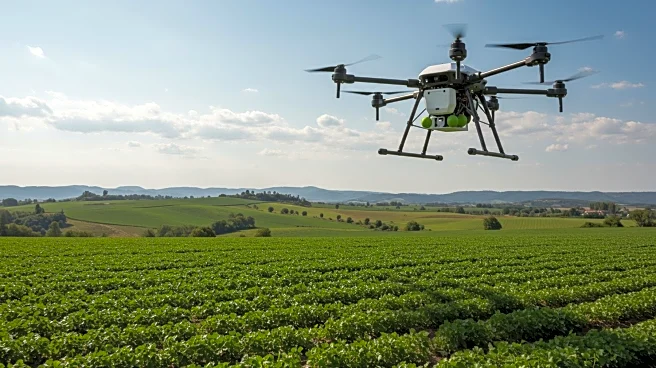What's Happening?
The agriculture sector is undergoing significant transformation with the introduction of advanced technologies aimed at enhancing productivity and sustainability. By 2025, Indian farms are expected to widely adopt AI-driven solutions for precision agriculture, integrating IoT, data analytics, robotics, drones, and satellite imaging. These technologies promise to optimize resource use, minimize wastage, and address climate change challenges, thereby bolstering food security. Key innovations include precision farming using IoT sensors for real-time monitoring of soil health, drones for crop stress analysis, AI for predictive analytics, and smart farm management platforms. Automation and robotics are also set to alleviate labor constraints, while blockchain technology will enhance traceability and food security in supply chains.
Why It's Important?
The adoption of these technologies is crucial for improving crop yields and ensuring sustainable agricultural practices. Precision tools and real-time monitoring can increase yields by up to 28%, while IoT and AI analytics help reduce overuse of fertilizers and pesticides, protecting both profitability and the environment. These advancements are particularly significant for smallholder farmers, offering them access to expert knowledge and market opportunities through blockchain traceability. Moreover, climate-resilient solutions such as drought-resistant seeds and vertical farming are essential for maintaining food security amid climate change. The integration of these technologies is expected to drive rapid digital transformation in the agriculture sector, with the market projected to reach $24 billion by 2025.
What's Next?
As these technologies become more mainstream, challenges such as fragmented landholdings, digital literacy gaps, and infrastructure limitations need to be addressed. Continued investment and collaborative efforts between public and private sectors are necessary to ensure equitable access and sustainable progress. Government initiatives like the Digital Agriculture Mission and Soil Health Cards play a foundational role in overcoming these barriers. The future of agriculture technology in India is poised to create a data-driven, sustainable ecosystem, empowering farmers to make informed decisions and enhance food security.
Beyond the Headlines
The ethical and cultural dimensions of this technological shift include the need for capacity building and training to ensure informed use of new technologies. Protecting sensitive farm and weather data is critical as digital agriculture scales up. Additionally, the integration of diverse platforms and IoT devices demands robust standards and adaptive policies. These considerations are vital for creating a resilient agricultural sector that aligns with global climate goals and addresses long-standing inequities.









